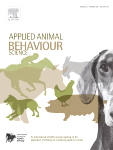Document type: Scientific article published in the Journal of Experimental Biology
Authors: Nawel Mezrai, Cécilia Houdelier, Aline Bertin, Ludovic Calandreau, Cécile Arnould, Anne-Sophie Darmaillacq, Ludovic Dickel, Sophie Lumineau
Preview: As the sensory systems of vertebrates develop prenatally, embryos perceive many environmental stimuli that can influence the ontogeny of their behaviour. Whether the nature and intensity of prenatal stimuli affect this ontogeny differently remains to be investigated. In this context, this study aimed to analyse the effects of prenatal auditory stimulation (natural stimulation, NS; predator vocalisations or artificial stimulation, AS; metallic sounds) on the subsequent behaviour of young Japanese quail (Coturnix coturnix japonica). For this, behavioural variables recorded during ethological tests evaluating emotional and social reactivity were analysed using a principal component analysis. This analysis revealed significant differences between the behavioural profile of stimulated chicks and that of non-exposed chicks. Indeed, chicks exposed to NS expressed more intense emotional responses in fearful situations, but less neophobia when exposed to a novel environment or object, whereas chicks exposed to AS appeared more sensitive to social isolation. Our results show that the acoustic environment of embryos can influence the way young birds subsequently interact with their social and physical environment after hatching, and face challenges in changing living conditions.
Publication giving rise to an article in The Conversation on 21 March 2022: Les sons entendus dans l’œuf forgent la personnalité des oisillons




